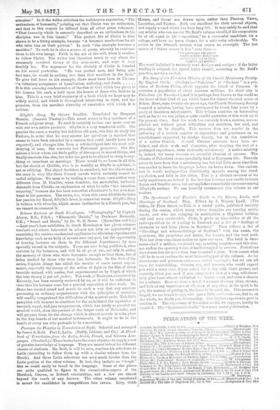Passages for Practice in Translation at Sight. Selected and arranged
by James S. Reid. Part I., Latin. (Daldy, Isbister, and Co.) A Hand- book of Translation front the Latin, Greek, French, and German Lan- guages. (Stanford.)—Theee books have the same object,—to supply a test of genuine knowledge of language. They are meant indeed for different classes of students. Mr. Reid, it will be seen confines his selections to Latin (intending to follow them up with a similar volume from the Greek). And these Latin selections are very much harder than the Latin pollen of the other volume. In fact, they include as "tough" bits as could easily be found in the language. Some of the pieces are quite qualified to figure in the examination-papers of the Hertford, Craven, or Ireland scholarships, and a few are almost beyond the reach of any learner. The other volume mentioned is meant for candidates in competitions less severe. Livy, Ovid, Horace, and Omar are drawn upon, rather than Plautus, Varro, Lucretius, and Tacitus. Both are excellent for their several objects, and supply a need which has been long felt. It may safely be said that any scholar who can master Mr.Reid's volume should,if his composition be at all equal to his "exposition," ha a successful candidate for a college, and have no mean chance for a university scholarship. We notice in the fifteenth extract what seems an oversight. The last stanza of "Dianai strums in title" runs thus :— "sis quecunque tibi placet sancta nomine. Romul:que Autivte ut s Jim ea bona sospites ope geutem."
The word italicised is variously read Ancigue and antique; if the latter reading is adopted, the initial hitter should, according to Mr. Reid's practice, not be a capital.


































 Previous page
Previous page